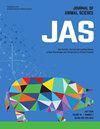反刍动物营养研讨会:优化牛肉和乳制品系统生产效率的新型微生物解决方案
IF 2.7
2区 农林科学
Q1 AGRICULTURE, DAIRY & ANIMAL SCIENCE
引用次数: 0
摘要
畜牧业正在寻求可持续技术,以提高食用动物生产的盈利能力和可持续性。在这些技术中,微生物解决方案包括可能支持土壤、植物和动物健康的活细菌。细菌接种剂是调控玉米青贮发酵最常用的添加剂,包括同种和异源发酵菌。细菌接种剂可以改善青贮草的发酵特性,而冷季和暖季草的化学成分和管理方法差异很大,使得接种结果难以预测。为了提高青贮接种的可预测性,包括整株玉米和草青贮,有必要根据菌种和管理实践,为细菌接种剂的种类和菌株提供量身定制的建议。微生物溶液也被用作肉牛和奶牛的饲料添加剂,包括芽孢杆菌基直接喂养微生物(DFM)。芽孢杆菌基DFM添加剂的最新进展表明,通过改善肠道健康、免疫功能和营养代谢,有望提高奶牛犊牛生产力。将芽孢杆菌基DFM纳入牲畜和饲养场接收计划,可以改善高风险牛的采食量和消化率、健康和生产力。以芽孢杆菌为基础的DFM也被用于饲养场日粮中,以解决公众对抗菌素耐药性的关注,同时也用于提高牛的生产性能和减少疾病的发病率。基于多物种细菌的DFM是对抗沙门氏菌潜在不利影响的有希望的替代品,因为这些DFM在体外环境下支持肠上皮细胞的完整性。在奶牛中,大多数与dfm相关的成熟奶牛研究的目标是改善瘤胃发酵和肠细胞健康。总的来说,由于补充以细菌为基础的DFM而获得的牛奶产量的改善似乎比以酵母为基础的DFM获得的改善更一致。总的来说,微生物解决方案有可能优化青贮质量,提高反刍动物的采食量和消化率,支持牛的健康和生产性能,同时促进牛肉和乳制品生产系统的可持续实践。本文章由计算机程序翻译,如有差异,请以英文原文为准。
Ruminant Nutrition Symposium: Novel microbial solutions to optimize production efficiency in beef and dairy systems
The livestock industry is in search of sustainable technologies that enhance profitability and sustainability of food animal production. Among these technologies, microbial solutions include living bacteria that may support soil, plant, and animal health. Bacterial inoculants have been the most used additives to modulate whole-plant corn silage fermentation, including homo- and heterofermentative bacteria. Bacterial inoculants can improve fermentation characteristics of grass silage, whereas the wide variation in chemical composition and management practices across cool- and warm-season grasses makes the outcome of inoculation less predictable. Tailored recommendations for bacterial inoculant species and strains, based on species and management practices are necessary to increase the predictability of silage inoculation, including whole-plant corn and grass silage. Microbial solutions are also used as feed additives for beef and dairy cattle, including Bacillus-based direct-fed microbials (DFM). Recent advancements in Bacillus-based DFM supplementation have shown promise for enhancing cow-calf productivity through improved gut health, immune function, and nutrient metabolism. Incorporating Bacillus-based DFM into stocker and feedlot receiving programs can improve feed intake and digestibility, health, and productivity of high-risk cattle. Bacillus-based DFM have also been used in feedlot diets to address public concerns with antimicrobial resistance, but also to improve cattle performance and reduce the incidence of diseases. Multispecies bacterial-based DFM are promising alternatives to counteract the potentially adverse effects of Salmonella, as these DFM supported the integrity of the intestinal epithelial cells under in vitro settings. In dairy cattle, most DFM-related research in mature cows has targeted improvements in rumen fermentation and enterocyte health. In general, improvements in milk production due to supplementation of bacteria-based DFM seem to be more consistent than those obtained with yeast-based DFM. Collectively, microbial solutions have the potential to optimize silage quality, enhance feed intake and digestibility by ruminants, support cattle health and performance, while fostering sustainable practices in beef and dairy production systems.
求助全文
通过发布文献求助,成功后即可免费获取论文全文。
去求助
来源期刊

Journal of animal science
农林科学-奶制品与动物科学
CiteScore
4.80
自引率
12.10%
发文量
1589
审稿时长
3 months
期刊介绍:
The Journal of Animal Science (JAS) is the premier journal for animal science and serves as the leading source of new knowledge and perspective in this area. JAS publishes more than 500 fully reviewed research articles, invited reviews, technical notes, and letters to the editor each year.
Articles published in JAS encompass a broad range of research topics in animal production and fundamental aspects of genetics, nutrition, physiology, and preparation and utilization of animal products. Articles typically report research with beef cattle, companion animals, goats, horses, pigs, and sheep; however, studies involving other farm animals, aquatic and wildlife species, and laboratory animal species that address fundamental questions related to livestock and companion animal biology will be considered for publication.
 求助内容:
求助内容: 应助结果提醒方式:
应助结果提醒方式:


